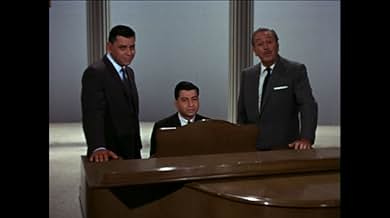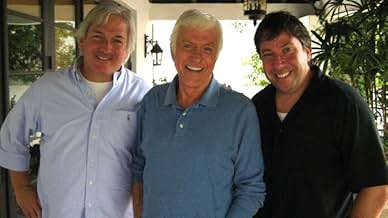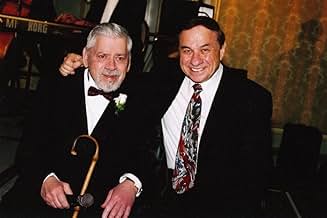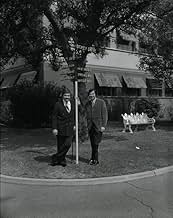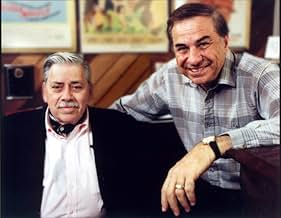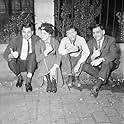The Boys: L'histoire des frères Sherman
Their music is unforgettable. Their name is legend. Delve into the lives and cinematic legacy of the prolific songwriting duo whose music has been featured in classic movies such as Mary Pop... Read allTheir music is unforgettable. Their name is legend. Delve into the lives and cinematic legacy of the prolific songwriting duo whose music has been featured in classic movies such as Mary Poppins (1964) and Le Livre de la jungle (1967).Their music is unforgettable. Their name is legend. Delve into the lives and cinematic legacy of the prolific songwriting duo whose music has been featured in classic movies such as Mary Poppins (1964) and Le Livre de la jungle (1967).
- Self
- (as Roy E. Disney)
Featured reviews
Watching Disney documentaries and being delighted with the tributes it has paid to the professionals behind the great works, simultaneously watching Frank and Ollie (two more than fraternal friends, excellent designers) and the Sherman brothers (two musically talented brothers, but not they got along well, they separated for years) wonderful masterpieces, well-deserved tributes, sincere, transparent, necessary and passionate works... This troubled union generated great successes...
Though "The Boys" was produced and distributed by The Disney Studios - for whom the duo worked for many years – and was written and directed by their sons, Gregory V. and Jeff Sherman, this is no hagiography designed to provide a whitewashed account of its subject. On the contrary, it provides us with a warts-and-all look at the siblings who, while they could make great music together on a professional level, found it virtually impossible to harmonize on a personal one. In fact, their relationship was so strained that they essentially raised their families in isolation from one another (they even attended separate funeral receptions when their parents passed away) - and still today, the two men, even in the twilight of their lives, have yet to heal the breach that separates them.
What's interesting – and, frankly a little maddening - about the film is that we're never quite sure what it is that caused this rupture, mainly because the boys themselves seem unable to account for it (half the time they seem to be unaware it even exists). All we know is that, for decades in public, they were able to put on a happy face and maintain the fiction that they were every bit as close as brothers as they were as songwriters, while out of the limelight and to the awareness of those who knew them, they had drifted irrevocably apart.
Through interviews with their children, co-workers and admirers over the years, as well as with Bob and Dick themselves, the movie chronicles their childhood growing up in New York City, then Beverly Hills; their devotion and indebtedness to their songwriting father, Al Sherman; Robert's injury in World War II and the trauma of helping to liberate Dachau; their early years writing pop songs together and with others; their entry into composing for the movies with a song for "The Parent Trap." Then it's on to their years as the only songwriters lucky enough to be under contract to Disney; their close personal relationship with Walt himself; their Oscar-winning triumph with "Mary Poppins;" their eventual split with the studio after the death of Walt; their later work through the '70s and beyond; and their reunion at the London premiere of the stage version of "Poppins" in 2006.
Despite the fact that the rift between the two is never adequately explained, the movie provides a treasure-trove of information, clips and snippets from that period in which they produced their work. There are moments of ribald humor and wistful nostalgia as we relive the memories the Sherman boys have provided for those of us fortunate enough to have grown up on their songs (they were even responsible for that most maddeningly memorable of ditties, "It's a Small World"). Indeed, in the face of all the personal animosity between the two men, it's the music and the memories that ultimately "help the medicine go down" while watching "The Boys: The Sherman Brothers' Story."
For a Disney release, it's also interesting to see non-Disney films incorporated to give a more balanced look at the brothers' film scores. For baby boomers, this film will be an added pleasure, since so much of this music here most likely was a strong presence during their growing years. Don't miss this one!
That their different interests, personalities and characters should be a source of creative conflict is amazing. But, they both testify to that in the numerous interview snippets included in this biographical documentary. The separation of their families for nearly four decades – when they lived just houses away from each other while the kids were growing up – that was tragic. All the more reason to congratulate their sons Gregory and Jeffrey for meeting to bury the hatchets they didn't even know they had, and make this biodoc as a way to tell the story of the Sherman Brothers and their accomplishments. And, in the process, to hopefully get their dads back together.
The documentary is first-rate in all aspects. It is excellent work, with excellent material that they researched and put together from the past. The interviews with others who worked with The Boys were spot on. And, this DVD too has some bonus material that gives even more information.
I'm sure that the people interviewed are right – that many of the Sherman Brothers' songs will live on for generations. The most popular and well known are "Chim Chim Cher-ee," "A Spoonful of Sugar," "Supercalifragilisticexpialidocious," "Winnie the Pooh," "The Wonderful Thing About Tiggers," "Chitty Chitty Bang Bang," "It's a Small World," and "Anything Can Happen." The brothers had great praise and admiration for Walt Disney. It was he who made them the resident music creators for all of the Disney ventures. Besides the two Oscars they won, they had dozens of nominations for major awards over the years and won a number.
They wrote 31 major movie scores, live action and animated, for Disney and others. They wrote dozens of songs for the Disney theme parks and for the Disney TV programs. Several became pop hits over the years – in addition to the above songs from their shows.
One thing that I found especially interesting about Bob, was his experience toward the end of World War II. He had just turned 17 and got permission form his parents to enlist in the Army in 1943. In this film, Bob says he and his squad were the first Americans to enter the Dachau prison camp. He said the sight of the corpses and ovens would be "nightmares for the rest of my life."
The film has a number of interviews with A.J. Carothers. He was a long- time playwright and TV writer with Disney, and a close friend of both Bob and Richard. He said that the positive songs of the boys were uplifting to everyone who worked around them. He described their musical output as joyful, fun and romantic. They didn't create sentimental music, but romantic songs. He quoted author F. Scott Fitzgerald for his definition. "A sentimental person thinks things will last, and a romantic hopes against hope they will not." That's from Fitzgerald's first novel, "This Side of Paradise."
Bob tells a story about how they came up with the word, "supercalifragilisticexpialidocious." "When we were really young kids, we went to summer camp. And, they had a contest. Who could make a longer word than antidisestablishmentarianism. That was a very famous word. And, we messed around. We came up with an idea for a word."
The Boys and others have asked how many people can say "supercalifragilisticexpialidocious" backwards. Richard said he could, and he rattled off a word. Unfortunately, the IMDb review won't accept my giving these examples with syllable breaks. The Web site says that my review contains too many spelling mistakes. So, I will just finish this with general references here. Julie Andrews said it the same way, but she admitted it as the syllables in reverse order – not the full word actually spelled and pronounced backwards. But even that wasn't the case, because in their example they recited six of the seven syllable breaks in reverse order but then said super backwards as well. So, their rendition is a mixed bag of some of the syllables backwards and in reverse order. For fun, I then spelled the word in reverse with syllable breaks for those who might want to take a crack at it. With this, it's obvious why the songwriters chose to try for just saying the syllables in reverse.
For trivia fans, the one-word song title has 34 letters and uses 15 of the 26 letters of the alphabet. Of those, 16 are vowels and 18 are consonants. The vowel used most is the letter "i," which appears seven times. I offer this all in the spirit of the Sherman Brothers and Walt Disney who brought us so much laughter and many smiles in their music, movies and stories.
Did you know
- TriviaAll entries contain spoilers
- Quotes
Robert B. Sherman: [talking about Mary Poppins author P.L. Travers] She was such a witch.
- Crazy creditsA clip from Charles A. Lindbergh (1927) is shown during the credits.
- ConnectionsEdited from Hollywood goes to a World Premiere (1964)
- SoundtracksLindbergh Eagle of the USA (1927)
Music by Al Sherman
- How long is The Boys?Powered by Alexa
Details
- Release date
- Country of origin
- Official site
- Language
- Also known as
- The Boys: The Sherman Brothers' Story
- Filming locations
- Production companies
- See more company credits at IMDbPro
Box office
- Gross US & Canada
- $55,513
- Opening weekend US & Canada
- $14,632
- May 24, 2009
- Gross worldwide
- $55,513
- Runtime1 hour 41 minutes
- Color
- Sound mix
- Aspect ratio
- 1.78 : 1
Contribute to this page








